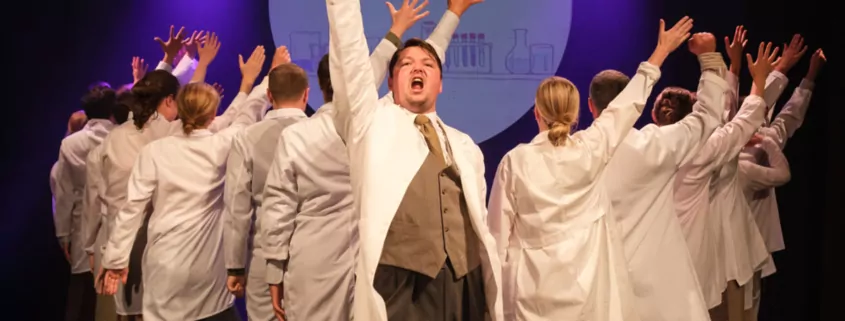Atlanta Scientists Sing About the Magic of Mold and Fleming’s Fears for the Future ‘The Mold That Changed the World’ Comes to Atlanta Starting November 1
Take a look at leftovers left out for too long and you might also see a bit of multicellular magic known as mold. Modern medicine as we know it is due in large part to the discovery of penicillin mold by Scottish scientist Alexander Fleming, who first noticed the fungus growing on a plate of staphylococcus culture nearly 100 years ago. Penicillin mold produces the natural antibiotic penicillin, which resulted in the groundbreaking fight against fatal infections like meningitis, strep throat, and gonorrhea.
But with the wonder of mold came a warning. Fleming’s biggest fear was the overuse of antibiotics, resulting in bacterial infections evolving to become resistant to treatment. Unfortunately, over-evolved bacteria known as “Superbugs” are now the third largest underlying cause of death in the world, with two million Americans developing an infection annually.
Fleming’s message still rings — or shall we say, sings — clear today: we must urgently decrease our overuse of antibiotics for the sake of our collective, long-term health. “The Mold That Changed the World” shares Fleming’s story and his wise warning in a setting where science rarely ventures – the stage.
Presented by the Charades Theatre Company and supported by the Centers for Disease Control (CDC) Foundation along with The Rockefeller Foundation, “The Mold that Changed the World” comes to Atlanta’s Science Gallery at Pullman Yards November 1 through 6, 2022.
But no need to take a composer’s word on the seriousness of superbugs. “The Mold The Changed the World” stars a chorus made up of local scientists and healthcare professionals who perform alongside a professional cast of West End actors and live five-piece band.
“Our chorus … bring(s) an integrity to the musical which cannot be replicated,” says Jess Conway, producer with Charades Theatre. “They have dealt firsthand with the problems that antimicrobial resistance can cause and understand the gravity of that threat which comes across in their committed and passionate performances.”
This unique composition of the play’s cast brings a resonance to its subject matter not often found elsewhere in the musical world. Paired with passionately-sung music alongside captivating drama, dance, and circus wheel acrobatics, composer Robin Hiley’s lively Scottish folk-influenced score and writer Thomas Henderson’s skill for storytelling bring a thought-provoking recounting of Fleming’s work to life.
Atlanta organizations represented in the local production include the CDC, CDC Foundation, the National Institutes of Health, Gwinnett County Fire & Emergency Services, Georgia State University, Grady Memorial Hospital, and Georgia Institute of Technology.
Perhaps these scientists felt compelled by Fleming’s own struggles to share the implications of his work, as many STEM professionals today fear their warnings fall flat.
“We know from anti-smoking campaigns and the COVID-19 pandemic that statistics and scare tactics don’t work,” Conway says. “People respond to human stories and a musical is such a great way to engage peoples’ empathy and attention.“
Science ATL is proud to highlight “The Mold That Changed The World” as not only a creative venture for many of our local scientists, but also as a testament to the lasting legacy and meaningful stories scientists share with the world.




